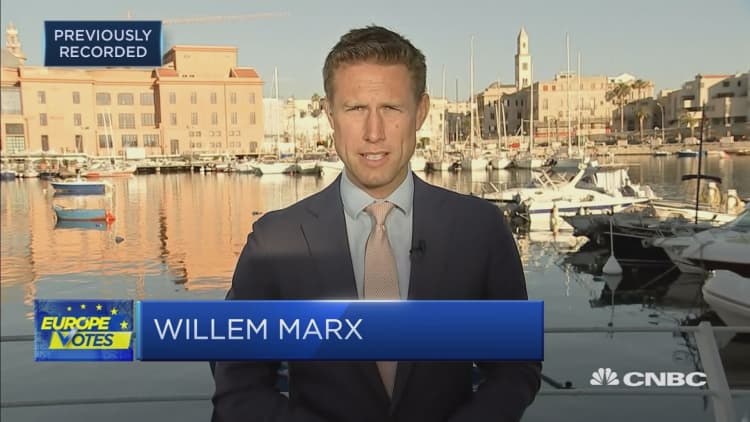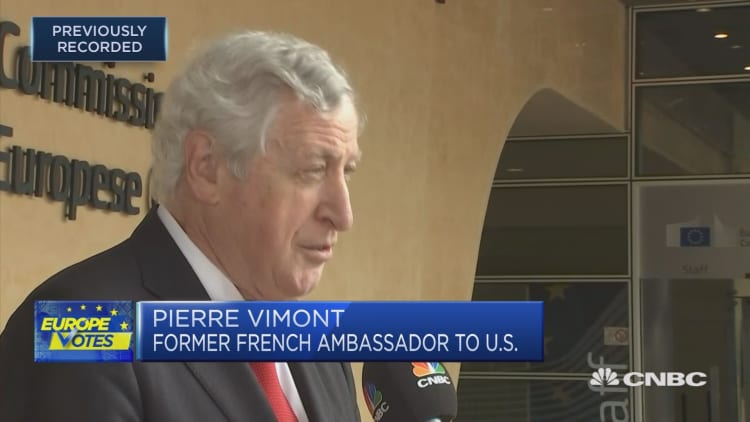
The future longevity of Italy's fractious coalition government remains uncertain ahead of European parliamentary elections, despite Deputy Prime Minister Matteo Salvini's insistence that success at the polls this week would not prompt renewed efforts to change his Lega party's governing agreement with the Five Star Movement (M5S).
"This vote is about Europe, to change Europe, to change banks, agriculture, borders," Salvini told CNBC in Bari, Italy, on Tuesday evening, after he was asked about the potential for a coalition collapse.
The unlikely alliance between a right-wing former separatist party and anti-establishment populists finally made it into office early last summer after months of wrangling over their respective manifestos and ministerial appointments.
Tensions between the two parties have heightened in recent months as the campaign for seats in the Brussels and Strasbourg-based parliament has crescendoed, and a first-time Lega candidate hinted to CNBC that the polls could indeed herald a shift in the government's dynamic.
"I think both the Five Star and Lega are willing to continue working together," said Ilaria Antelmi, who is standing for a Lega seat in the southern region of Italy, ahead of a final campaign stop by Salvini in Bari, a southeastern coastal city. "But after the European elections, we will see what the Italian people really think. We will understand where the balance of power lies."
Her party leader Salvini was smilingly adamant in his interview with CNBC that he would seek no such alterations to his party's deal with its coalition partners. "Nothing is going to change within the Italian government," he said. "I just hope that, after the election, our relationship with the Five Star Movement will be less confrontational."
"But even if I win, we won't ask for more ministers, we are not going to change anything."
Populist groups in Europe — among them the anti-immigration Lega party — have polled strongly during the electoral campaign and stand to make significant seat gains in the next European legislature.
Those changed levels of support were evident in the heart of Bari's commercial district Tuesday night. Residents loudly cheered Salvini's speech from a soundstage then lined up in their hundreds to take selfies with the leader of a party that had until quite recently railed against residents of southern Italian cities like Bari for their perceived ignorance and laziness.
There were signs too of Salvini and Lega critics, who have grown increasingly vocal. Alongside a heavy police presence, dozens marched in protest at his appearance in the city, carrying placards that read: "Fascist clown, leave the south" and "Salvini, chattering fool."

And while the divisive political rhetoric between the governing partners has at times taken on personal undertones as well, it is policy differences and the potential for a government collapse that remain a more central focus for investors, after the Five Star Movement leader Luigi di Maio labeled Salvini's public dismissal of European spending limits as "irresponsible."
"Our views are often different," acknowledged Lega candidate Antelmi. "But like in every coalition, things are negotiated and change all the time."
Some political analysts seem to view the inter-party sniping as just the latest play in modern Italy's political theater. "Part of the conflict is for electoral purposes," says Wolfango Piccoli, the co-president at political consultancy Teneo Intelligence.
"For the campaign they decided to go for this fight between these two parties. It got a bit heated which is not surprising given the characters involved."
But Piccoli says the hardline Lega approach could ultimately damage its electoral chances. The Five Star Movement "is playing the card of the responsible party," he insists. "Whereas Salvini has been continuing with the polarizing in this campaign."
"He's a good speaker, he's got these abilities to convey these messages to people that were basically bored of listening to politicians. But half the stuff he's talking about … does not stand up to scrutiny."
Previous Lega campaign promises to deport around 50,000 migrants, and introduce a flat tax have so far failed to materialize after 11 months in government. But this may not matter if voters this week buy into Salvini's continued criticism of Europe and its migration policies, and support for other right-wing parties holds firm.
"The Lega will be freer to consider engineering a return to the polls," said Federico Santi, a senior analyst at Eurasia Group, in a research note dated May 9. "To cash in on its good polling numbers and try to return to power at the head of a more cohesive coalition of right-wing parties."
"A better-than-expected performance by the Lega in the upcoming elections (considerably above 30%) could force Salvini's hand, especially if coupled with a very poor result by Five Star (at or below 20%)," he added.

